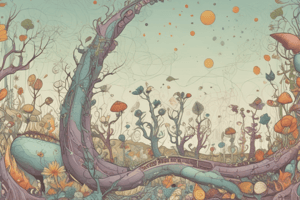Podcast
Questions and Answers
What does the term 'homozygous' refer to in genetics?
What does the term 'homozygous' refer to in genetics?
- An individual carrying a genetic disease in one allele
- An individual who produces offspring with various traits
- An individual that has inherited two identical alleles for a gene (correct)
- An individual with two different alleles for a gene
In a monohybrid cross with the alleles B for brown eyes and b for blue eyes, what is the probability of producing an offspring with blue eyes?
In a monohybrid cross with the alleles B for brown eyes and b for blue eyes, what is the probability of producing an offspring with blue eyes?
- 100%
- 50% (correct)
- 75%
- 25%
Which law states that each offspring will inherit only one allele for each trait from each parent?
Which law states that each offspring will inherit only one allele for each trait from each parent?
- Law of Dominance
- Law of Independent Assortment
- Law of Segregation (correct)
- Law of Trait Inheritance
What best describes a 'carrier' in genetic terms?
What best describes a 'carrier' in genetic terms?
Which statement accurately describes a 'trait'?
Which statement accurately describes a 'trait'?
During a dihybrid cross using R for round seed and r for wrinkled seed, along with Y for yellow seed and y for green seed, how many different genotype combinations can be produced?
During a dihybrid cross using R for round seed and r for wrinkled seed, along with Y for yellow seed and y for green seed, how many different genotype combinations can be produced?
What is the definition of 'phenotype' in genetics?
What is the definition of 'phenotype' in genetics?
Which of the following correctly describes the F1 generation in genetics?
Which of the following correctly describes the F1 generation in genetics?
Which allele is expressed in a heterozygous genotype?
Which allele is expressed in a heterozygous genotype?
The P generation is defined as which of the following?
The P generation is defined as which of the following?
Flashcards are hidden until you start studying
Study Notes
Heredity and Genetics
- Heredity is the passing of traits from parents to offspring.
- Genetics is the study of heredity and how traits are inherited.
Genotype and Phenotype
- Genotype: The genetic makeup of an individual, represented by the alleles they possess.
- Phenotype: The physical expression of the genotype, what we can observe.
Alleles and Traits
- Gene: A segment of DNA that codes for a specific trait.
- Allele: A version of a gene, there are usually two or more alleles for each gene.
- Trait: A specific characteristic or feature of an organism.
Homozygous and Heterozygous
- Homozygous: An individual with two identical alleles for a particular gene.
- Heterozygous: An individual with two different alleles for a particular gene.
Dominant and Recessive Alleles
- Dominant allele: An allele that expresses its trait even when paired with a recessive allele.
- Recessive allele: An allele that is only expressed when paired with another recessive allele.
Inheritance Patterns
- Carrier: An individual who carries a recessive allele for a trait but does not express it.
- True-breeding: Individuals that consistently produce offspring with the same traits as themselves.
- Hybrid: An individual that results from the cross of two different true-breeding individuals, leading to offspring with different versions of the traits.
Laws of Inheritance
- Law of Dominance: When two different alleles for a trait are present, the dominant allele masks the expression of the recessive allele.
- Law of Segregation: Each parent contributes only one allele to their offspring for each trait.
- Law of Independent Assortment: Different traits are inherited independently of each other.
Monohybrid Cross
- A cross between two individuals that differ in only one trait.
- Example: Brown eyes (B) are dominant to blue eyes (b). A cross between a homozygous brown-eyed parent (BB) and a homozygous blue-eyed parent (bb) will result in all offspring having brown eyes (Bb).
Dihybrid Cross
- A cross between two individuals that differ in two traits.
- Example: Round seeds (R) are dominant to wrinkled seeds (r), and yellow seeds (Y) are dominant to green seeds (y). A dihybrid cross between two individuals that are heterozygous for both traits (RrYy) will result in 16 possible combinations of offspring.
Generations
- P generation: The original parental generation in a cross experiment.
- F1 generation: The first generation of offspring produced from the P generation.
- F2 generation: The second generation of offspring produced from a cross between two F1 individuals.
Studying That Suits You
Use AI to generate personalized quizzes and flashcards to suit your learning preferences.





